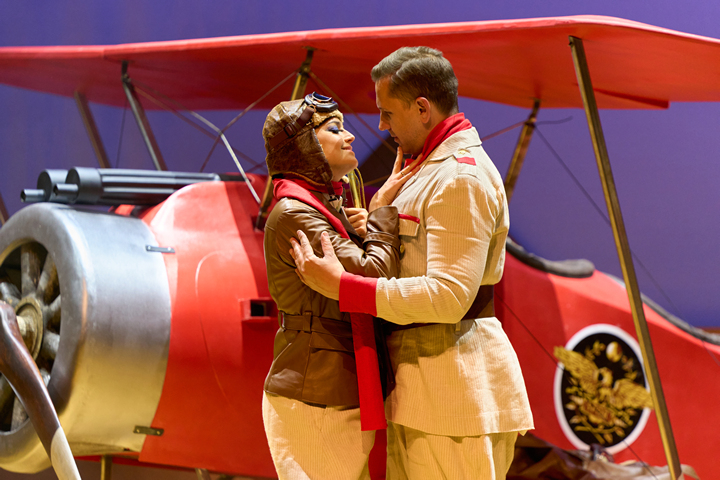| Opera Reviews | 2 June 2024 |
A worthy production to start the Festival’s second centuryby Catriona Graham |
|
Handel: Giulio Cesare in Egitto
|
|

|
|
|
Julius Caesar must be one of the best-known people ever. So many books, plays, operas, films and tv series have been written about him, and the Göttingen International Handel Festival kicks off its second century with Nicola Francesco Haym’s and Handel’s version of his adventures, Giulio Cesare in Egitto. George Petrou, the new artistic director of the Festival, is both stage and musical director of this production and, in his vision, Caesar is a Howard Carter-type figure, who enters a tomb and the contents ‘come to life’. So the Egyptians are in ancient dress and the conquerors are in 1920s tropical whites. Paris Mexis’ set, lit by Stella Kaltsou, features a large statue of a seated Pharaoh - which turns out to be a mega sarcophagus - and a few smaller sarcophagi. Inevitably, the Curse of Covid struck the production, with local factotum Nireno being replaced at very short notice by Alexander de Jong, a very talented assistant director who knows the moves but doesn’t sing, and with Nicholas Tamagna (Tolomeo) singing Nireno’s one aria from ipad and stage-side box. The cast’s singing is delicious. Yuriy Mynenko is an understated, restrained Giulio – after all, he isn’t really Caesar - though his singing is anything but. There is a clear, bell-like quality to his top notes when required; not, as in his musical duel with the violin ‘Se in fiorito ameno prato’, competitively camping up the ornamentation which is imitated in the on-stage playing of Milos Valent, and in which he plays with his impressively lowest register. Tolomeo emerges from his sarcophagus and, progressively, from his mummy-wrapping bandages, whereas Cleopatra (Sophie Junker) is dressed in gold in her tomb. In her ornamentation, there is a hint of non-Anglo-German-Italianate melodic progressions. She really winds up her brother, with Tolomeo exhibiting all the signs of being a pampered brat. He petulantly stamps his feet, and sulks, not just when out-manoeuvred by his sister. In ‘V’adoro, pupille,’ Cleopatra sets out to seduce Caesar and seduces the audience as well. This takes place in what looks like a 1920s Cairene night club. As a curtain-raiser, Nireno does a partial strip, revealing a belly-dance outfit, to a jazzed-up vaga sinfonia de vari instrumenti, with classy piano from Panos Iliopoulos. If you like that sort of thing, it is great. For those who like their baroque pure, on the other hand … In contrast, Cornelia, the wife of Cesare’s frenemy Pompey, is vulnerable in her grief and in her lack of protection, seeking also to protect her son. Francesca Ascioti’s slight frame accentuates that vulnerability, not least when pestered by Achilla, chiefest of the dog’s-head mask-wearing priests, or sexually assaulted by Tolomeo. Her duet with Sesto, 'Son nata a lagrimar', is heart-breakingly beautiful in its despair. Sesto is played by Katie Coventry, in boy-scout-ish shorts, pitched perfectly immediately pre-pubescent, keen to protect his mother (which he can’t) and avenge is father (which is foolhardy). Her voice is perfect for the role, fresh and clear, sufficiently different from Ascioti’s for the vocal lines to stand out. And then there is chief doghead – Achilla, sung by Riccardo Novaro. Is he really working for Tolomeo, or is he freelancing? For ' In tal’ modo si premia', he removes the mask for the recapitulation, one of many which takes place in front of a black drop, frequently with projected images and video. Clearly for scene-changes, but it does get a bit repetitive. Throughout, the FestspielOrchester produces its usual classy sound. So many passages of playing are a sheer delight, the solo instruments seamlessly duet with singers with delicacy and precision. This is a worthy production to start the Festival’s second century. |
|
Photo © Frank Stefan Kimmel |
|







